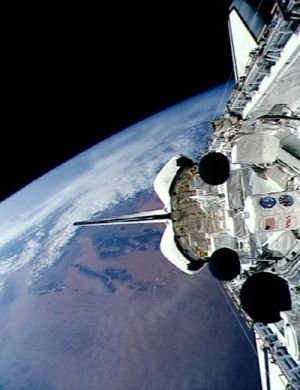
Home - Search - Browse - Alphabetic Index: 0- 1- 2- 3- 4- 5- 6- 7- 8- 9
A- B- C- D- E- F- G- H- I- J- K- L- M- N- O- P- Q- R- S- T- U- V- W- X- Y- Z
STS-45
 STS-45 Credit: NASA |
AKA: Atlantis;ATLAS-1. Launched: 1992-03-24. Returned: 1992-04-02. Number crew: 7 . Duration: 8.92 days.
Payloads: Atmospheric Laboratory for Applications and Science (ATLAS)-1, Shuttle Solar Backscatter Ultraviolet (SSBUV)-4, Getaway Special Experiment G-229, Space Tissue Loss (STL)-1, Radiation Monitoring Equipment (RME)-III, Visual Function Tester (VFT)-II, Cloud Logic To Optimize Use of Defense Systems (CLOUDS)-1A, Investigations Into Polymer Membrane Processing (IPMP), Shuttle Amateur Radio Experiment (SAREX)-Il, Ultraviolet Plume Instrument (UVPI).
Orbits of Earth: 143. Distance traveled: 5,994,719 km. Orbiter Liftoff Mass: 105,981 kg. Orbiter Mass at Landing: 93,003 kg. Payload to Orbit: 8,020 kg. Payload Returned: 8,020 kg. Landed at: Concrete runway 33 at Kennedy Space Center, Florida. Landing Speed: 361 kph. Touchdown miss distance: 548 m. Landing Rollout: 2,809 m.
NASA Official Mission Narrative
Mission Name: STS-45 (46)
Atlantis (11)
Pad 39-A (45)
46th Shuttle Flight
11th Flight OV-104
KSC Landing (9)
Crew:
Charles F. Bolden (3), Commander
Brian Duffy (1), Pilot
Kathyrn D. Sullivan (3), Payload Commander
David C. Leestma (3), Mission Specialist 2
C. Michael Foale (1), Mission Specialist 3
Byron K. Lichtenberg (2), Payload Specialist 1
Dirk D. Frimout (1), Payload Specialist 2
Milestones:
OPF - 12/9/91
VAB - 2/13/92
PAD - 2/19/92
Payload:
ATLAS-01,SSBUV-04,STL-01,IPMP,SAREX(2),VFT-2,RME-III,CLOUDS-1A,GAS(x1)
Mission Objectives:
Launch:
March 24, l992, 8:13 a.m. EST. Launch originally scheduled for March 23, but was delayed one day because of higher the allowable concentrations of liquid hydrogen and liquid oxygen in the orbiter's aft compartment during tanking operations. During troubleshooting, the leaks could not be reproduced, leading engineers to believe that they were the result of plumbing in the main propulsion system not thermally conditioned to the super cold propellants. Launch was rescheduled for March 24. Launch Weight: 233,650 lbs.
Orbit:
Altitude: 160nm
Inclination: 57.0 degrees
Orbits: 143
Duration: 8 days, 22 hours, 9 minutes 28 seconds.
Distance: 3,238,177 miles
Hardware:
SRB: BI-049
SRM: 360L/W021
ET : 44/LWT-37
MLP : 1
SSME-1: SN-2024
SSME-2: SN-2012
SSME-3: SN-2028
Landing:
April 2, 1992, 6:23 a.m. EST, Runway 33, Kennedy Space Center. Rollout distance 9,227 feet. Mission extended one day to continue science experiments. Landing Weight: 205,042 lbs.
Mission Highlights:
Carried first Atmospheric Laboratory for Applications and Science (ATLAS-1) on Spacelab pallets mounted in orbiter's cargo bay. The non-deployable payload, equipped with l2 instruments from the U.S., France, Germany, Belgium, Switzerland, The Netherlands and Japan, conducted studies in atmospheric chemistry, solar radiation, space plasma physics and ultraviolet astronomy. ATLAS-1 instruments were: Atmospheric Trace Molecule Spectroscopy (ATMOS); Grille Spectrometer; Millimeter Wave Atmospheric Sounder (MAS); Imaging Spectrometric Observatory (ISO); Atmospheric Lyman-Alpha Emissions (ALAE); Atmospheric Emissions Photometric Imager (AEPI); Space Experiments with Particle Accelerators (SEPAC); Active Cavity Radiometer (ACR); Measurement of Solar Constant (SOLCON); Solar Spectrum (SOLSPEC); Solar Ultraviolet Spectral Irradiance Monitor (SUSIM); and Far Ultraviolet Space Telescope (FAUST). Other payloads included Shuttle Solar Backscatter Ultraviolet (SSBUV) experiment, one get-away Special (GAS) experiment and six mid-deck experiments.
More at: STS-45.
Family: Manned spaceflight. People: Bolden, Duffy, Foale, Frimout, Leestma, Lichtenberg, Sullivan. Country: USA. Spacecraft: Atlantis. Projects: STS. Launch Sites: Cape Canaveral. Agency: NASA, NASA Houston.
1992 March 24 - . 13:13 GMT - . Launch Site: Cape Canaveral. Launch Complex: Cape Canaveral LC39A. Launch Platform: MLP1. LV Family: Shuttle. Launch Vehicle: Space Shuttle.
- STS-45 - .
Call Sign: Atlantis. Crew: Bolden,
Duffy,
Foale,
Frimout,
Leestma,
Lichtenberg,
Sullivan.
Payload: Atlantis F11 / Atlas 1 Fwd. Mass: 8,020 kg (17,680 lb). Nation: USA.
Related Persons: Bolden,
Duffy,
Foale,
Frimout,
Leestma,
Lichtenberg,
Sullivan.
Agency: NASA Houston.
Program: STS.
Class: Manned.
Type: Manned spaceplane. Flight: STS-45.
Spacecraft Bus: Shuttle.
Spacecraft: Atlantis.
Duration: 8.92 days. Decay Date: 1992-04-02 . USAF Sat Cat: 21915 . COSPAR: 1992-015A. Apogee: 294 km (182 mi). Perigee: 282 km (175 mi). Inclination: 57.00 deg. Period: 90.30 min.
Manned seven crew. Carried ATLAS-1 experimental package. Payloads: Atmospheric Laboratory for Applications and Science (ATLAS)-1, Shuttle Solar Backscat-ter Ultraviolet (SSBUV)-4, Getaway Special Experiment G-229, Space Tissue Loss (STL)-1, Radiation Monitoring Equipment (RME)-lIl, Visual Function Tester (VFT)-lI, Cloud Logic To Opti-mize Use of Defense Systems (CLOUDS)-1A, Investigations Into Polymer Membrane Process-ing (IPMP), Shuttle Amateur Radio Experiment (SAREX)-Il, Ultraviolet Plume Instrument (UVPl).
1992 April 2 - .
- Landing of STS-45 - . Return Crew: Bolden, Duffy, Foale, Frimout, Leestma, Lichtenberg, Sullivan. Nation: USA. Related Persons: Bolden, Duffy, Foale, Frimout, Leestma, Lichtenberg, Sullivan. Program: Spacelab. Flight: STS-45. STS-45 landed at 11:21 GMT. .
Back to top of page
Home - Search - Browse - Alphabetic Index: 0- 1- 2- 3- 4- 5- 6- 7- 8- 9
A- B- C- D- E- F- G- H- I- J- K- L- M- N- O- P- Q- R- S- T- U- V- W- X- Y- Z
© 1997-2019 Mark Wade - Contact
© / Conditions for Use